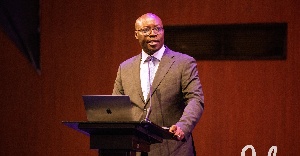Business News of Tuesday, 3 June 2025
Source: www.ghanawebbers.com
Gov’t offers to expand existing bonds, in bid to satisfy creditors seeking more liquid investments
Bondholders control about 60 percent of the US$117.8 million in Saderea notes. They seek full repayment without any reductions. This contrasts with other international investors who accepted losses during recent debt restructuring.
The government proposed a ‘tap issuance’ to expand existing bonds from October 2024. This would give Saderea bondholders more liquid investments for trading on international markets.
Under this proposal, bondholders would exchange their investments for four new government bonds. These bonds would have maturity dates from 2026 to 2035. For every US$1,000 held, investors would receive about US$742 in new bonds.
This represents a 39 percent reduction in value, which bondholders rejected. They want newly issued bonds through the October 2024 debt exchange without losses.
The disagreement focuses on ‘comparability of treatment.’ This principle states that all creditors should face similar losses. Other international bondholders accepted a 48 percent reduction last year.
The Ministry of Finance stated that the Saderea Ad Hoc Committee’s proposal does not align with this principle. The Saderea bonds carry a 12.5 percent interest rate and were due for repayment in 2026.
These are secured bonds, offering more protections than standard government debt. The negotiating team has presented three proposals since talks began, advised by Lazard Frères and Hogan Lovells.
Bondholders are represented by Cleary Gottlieb Steen & Hamilton law firm. The first government proposal offered US$630 for every US$1,000 owed but was rejected.
Bondholders then proposed full recognition of past due interest at the original rate and compensation for previous payments made to others. They also requested payment for their legal fees.
The second government proposal involved tap issuance but was also rejected by bondholders. Negotiations continue as the nation implements an economic recovery program supported by the International Monetary Fund (IMF).
About US$13 billion in international bonds were restructured to restore debt sustainability after an economic crisis. Finance officials say any agreement must align with Ghana's IMF framework and ensure equal treatment among creditors.
Bondholders declined to extend a confidentiality agreement governing talks, suggesting negotiations may become public. The government intends to engage in good faith to find a solution.
The domestic economy shows signs of recovery after debt restructuring, with falling inflation and stabilizing currency values against major currencies. However, pressure remains on the government to conclude remaining negotiations to restore investor confidence fully.
Saderea bonds represent a small portion of total debt but are crucial for demonstrating fair treatment of all creditors post-restructuring. Any agreement must satisfy both bondholder desires for tradeable securities and the government's need for meaningful debt relief.
The Ministry of Finance has indicated that disclosed information is price-sensitive and could impact trading values in secondary markets.











